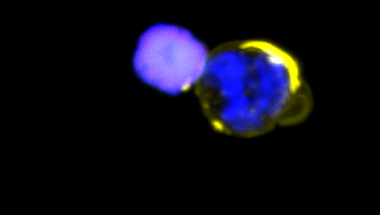
Dr Annika Warnatsch
Sir Henry Dale Fellow
- Deputy Academic Lead for 5th Floor Operations
Biography
Annika pursued her PhD in Biochemistry at the Charité Berlin, where she studied the regulation of proteasomes as well as the importance of the oxidative stress response during viral infections. She developed an interest in reactive oxygen signalling during innate immune responses and joined Venizelos Papayannopoulos’ lab at the Francis Crick Institute in London to work with neutrophils. These innate immune cells produce a powerful oxidative burst and play a crucial role in clearing infections. Poorly regulated immune responses cause tissue damage and pathology. For example during severe influenza A virus infection, the control of excessive inflammatory responses is vital. Annika's research is investigating the localisation and effects of reactive oxygen signalling during influenza infection, which could have a profound impact on antiviral inflammation and virus clearance. Her programme could ultimately lead to new therapeutic approaches targeting novel signalling pathways in patients with severe influenza as well as for inflammatory or autoimmune diseases in general.
Research

Warnatsch Group
The Warnatsch group studies the localisation and effects of neutrophil reactive oxygen species (ROS) during respiratory virus infections.

Microbes in Health & Disease
The Microbes in Health & Diseases Research Interest Group aims to foster collaboration across departments and faculties at KCL to explore the multifaceted role microbes play in health and disease.

King’s MechanoBiology Centre (KMBC)
The King’s MechanoBiology Centre gives a common platform for researchers across different disciplines with complementary interests in mechanobiology

Immunometabolism (iMet) Research Interest Group (RIG)
The aim of the i-met research interest group is to stimulate novel collaborations in the field of Immunometabolism, a young but rapidly growing field of research.
Research

Warnatsch Group
The Warnatsch group studies the localisation and effects of neutrophil reactive oxygen species (ROS) during respiratory virus infections.

Microbes in Health & Disease
The Microbes in Health & Diseases Research Interest Group aims to foster collaboration across departments and faculties at KCL to explore the multifaceted role microbes play in health and disease.

King’s MechanoBiology Centre (KMBC)
The King’s MechanoBiology Centre gives a common platform for researchers across different disciplines with complementary interests in mechanobiology

Immunometabolism (iMet) Research Interest Group (RIG)
The aim of the i-met research interest group is to stimulate novel collaborations in the field of Immunometabolism, a young but rapidly growing field of research.
